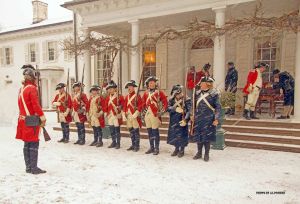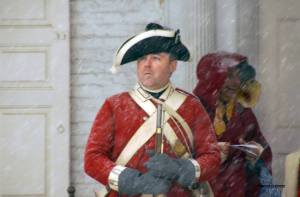Tags
authenticity, interpretation, living history, New Jersey, Princeton, Ravages of Princeton, Revolutionary War, winter
What if they had a reenactment and there was no battle? Can you really interpret military history without a battle?
Why yes; yes, you can. And you can do it well, engaging and exciting visitors and interpreters alike.
Last Saturday, Princeton was under British occupation once again, as we recreated the winter of 1777 this past weekend. I joined the planning for this back in October– I double checked– and it really started months before that. Many hands (and imaginations) make events like this work, but for me, the most exciting part was helping to produce an essentially civilian day of programming that interpreted the Revolutionary War in New Jersey. Yes, there was “a musket thing” mid-day, but that wasn’t the focus of the action.
HM 17th Regiment made their base of operations/occupation the porch of Morven House (formerly Richard Stockton’s residence) while the populace of Princeton attempted to go about their daily lives in Palmer Square. Quakers found themselves pressed to sign the Oath of Allegiance to King George III, despite their protestations that they could not take sides in a war.

Quakers and citizens, surrounded by occupying troops, listen to the officer’s exhortations. From instagram @thebentspoon
Some citizens seemed all too eager to sign the Oath, though rumor had it that one had previously pledged his loyalty to the rebel cause. (Sources have it that by the summer of 1778, this miscreant will be exacting revenge upon his neighbors as a Retaliator.)
Vignettes were drawn from documentation like the Brief Narrative of the Ravages of the British and Hessians at Princeton, 1776-1777:
“Triumph on that Days Victory the noted third day of January 1777 when they took two men and a Woman that could not stand Prisoners one of the men being much younger then the other & haveing shoes on made his Escape The Woman being unable to march they left her so they had in truth none from Princetown to Crown their Conquest with but the poor Old Captive without shoes. This is the Renowned Victory Obtained that day near Prince- town Which (it is said) is amply set forth in one of the New York newspapers 1 to be a Compleat victory obtained by the Regulars over the Continental Army so far as I have Related is true according to best Information that I can get, And so far I agree with that news Paper that the Regulars gained a Victory over two men and one woman. …. In takeing these three Prisoners they violated three of their Officers Protections for the two men had Each of them one, and the Womans Husband had another Besides they are all Reputed Quakers…” (Brief Narrative pp 18-20)
The constant snow kept our shoes on, but goods were stolen, occupants assaulted, soldiers beaten, prisoners taken, and justice served.
Hardy visitors followed us from Morven to Palmer Square and back, and one of the most exciting moments of the day for me was when a visitor said, “Wow, so the [British] soldiers didn’t really protect you, did they? You couldn’t count on them to keep you safe!” This seemed a pretty good summation of our interpretive goals:
- The British failed to win the “hearts and minds” of New Jersey residents because they turned liberation into occupation.
- The British lost the war in New Jersey because they treated everyone as a traitor.
- The revolutionary war in New Jersey was as much a civil war as a rebellion against the crown.
I count that a major win for living history.




The way the colors, the reds and greens and blues show off against the snow. Stunning.
One thing.
You are making my head cold!
Seriously. As I scroll through the photos, I get goosebumps. Then I get chilled… chilly…. cold…. and then I realize my head is freezing!!!
The women look sensibly dressed in wool layers upon wool layers. I’m assuming wool drawers, wool stockings, wool and or quilted petticoats under the wool dresses and wool outerwear. But, so many photos make me worry for your poor cold heads. Okay, the nice wide brims have a distinct advantage for blocking the snow from the face and dampening the glare of the sun and snow. Beyond that, I just can’t believe caps and kerchiefs keep the head very warm. And, the ears. Oh, the poor ears. I will spare you a photo of my still deformed twenty years later from frostbite ear.
Of course, this has me thinking. I have spent how much time researching Victorian era sewn winter head wear, I really ought to learn about 18th century and Regency era winter head wear. Off to look at paintings.
I know there were quilted hoods in the 18th century– I think there is one at LACMA. I haven’t asked the lads about their ears but you raise excellent points. I tie my hat or bonnet on with a kerchief, and then pull my wool cloak hood up over that. For additional coverage and wind block, I tie another kerchief around my cloak at the neck. (Photos forthcoming.) That seems to work pretty well, but I know one of the young women was cold despite her layers. I know, too, that she wore a hat and not a bonnet. Could be a major factor.
And I do think winter headwear for 18th and early 19th century would be much appreciated– I’m quite jealous of the quilted silk hoods you make.
My ears were covered by my Quaker(ish) cap, and I did find that the straw hat helped keep my head warm.
The only part of me that got uncomfortable on occasion was the tips of my fingers, which was why I had them under a blanket.
I don’t have drawers, and I didn’t “cheat” and wear leggings, but with all of the layers (shift, cotton/linen p’coat, two wool– one very heavy)– p’coats, and a wool gown…. I was incredibly warm. Sweating, in some cases.
My post on layers & warmth is tomorrow. Layers for the win.
I can say from experience the pain of frost bite to the ears is not felt until they begin to warm up. I suspect some may have felt it on the return home.
Your process with the kerchiefs sounds practical. Preventing the wind entry is often as if not more important. I am going to remember that you tie one around the cloak. I have found the hoods for cloaks or coats to not stay where I need them in any century.
I will expand my timeline earlier for my hood research.
Actually I was probably the sole person without some sort of hat or bonnet at the event and was surprisingly ok. Tying Jeremy’s cotton b&t neckerchief around my cap kept my ears warm and my cap on, and the hood lined in Jeremy’s old waistcoat was wonderful. Wrapping a blanket around it all was good too, although that was mostly around the body and not the head. I’d say I was almost one of the warmer ones this weekend potentially, and I’m a literal stick figure.
Thank you for finally writing about this event. Our friend from the Midwest attended and he very much enjoyed the experience!! I would also love to see some research about winter head coverings for the 18th century.
You’re welcome! It takes time to digest and enormous patience to wait for images to appear. And there was the whole thaw-the-fingers factor… 🙂
Pingback: My Life as a Chair, or, Warm in Winter | Kitty Calash
Pingback: Occupation as Liberation | Kitty Calash
Pingback: Clear and Present Danger | Kitty Calash